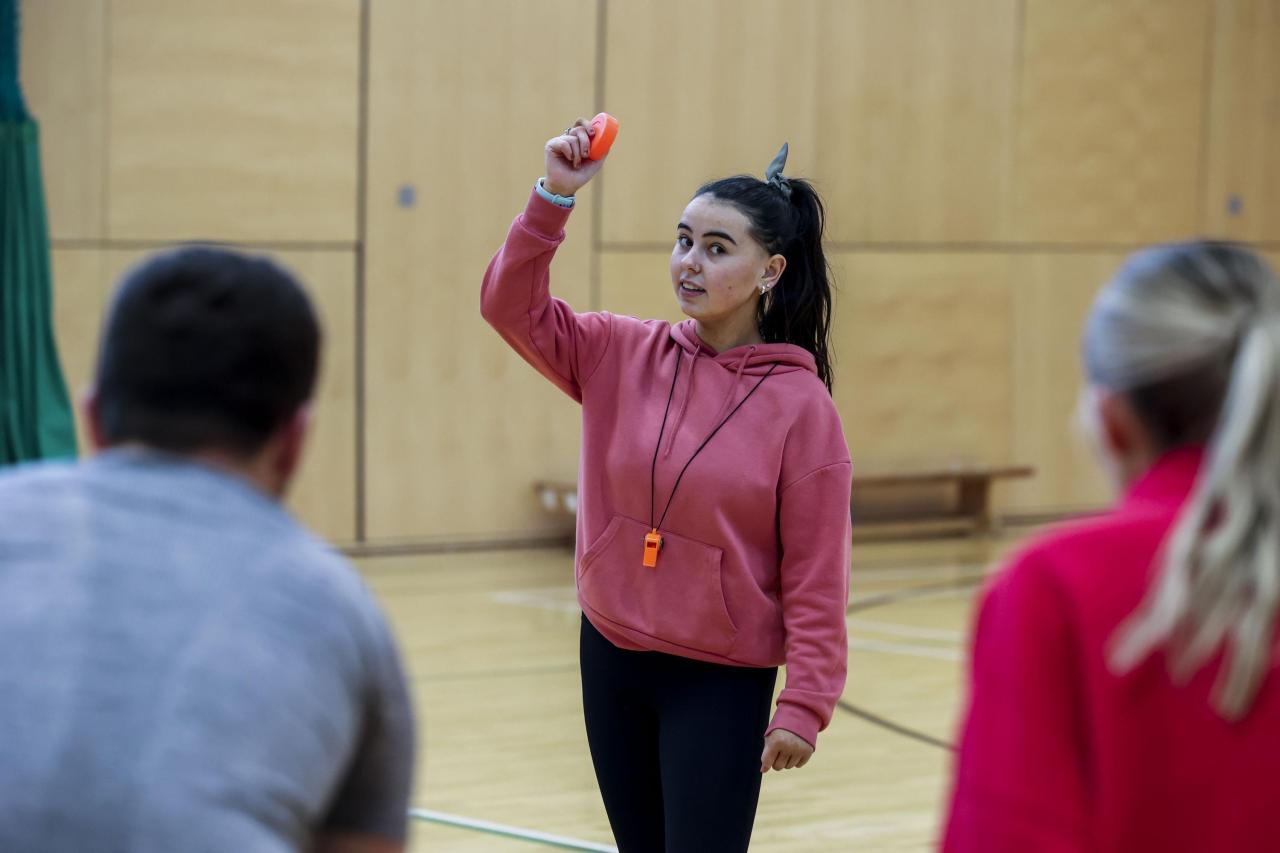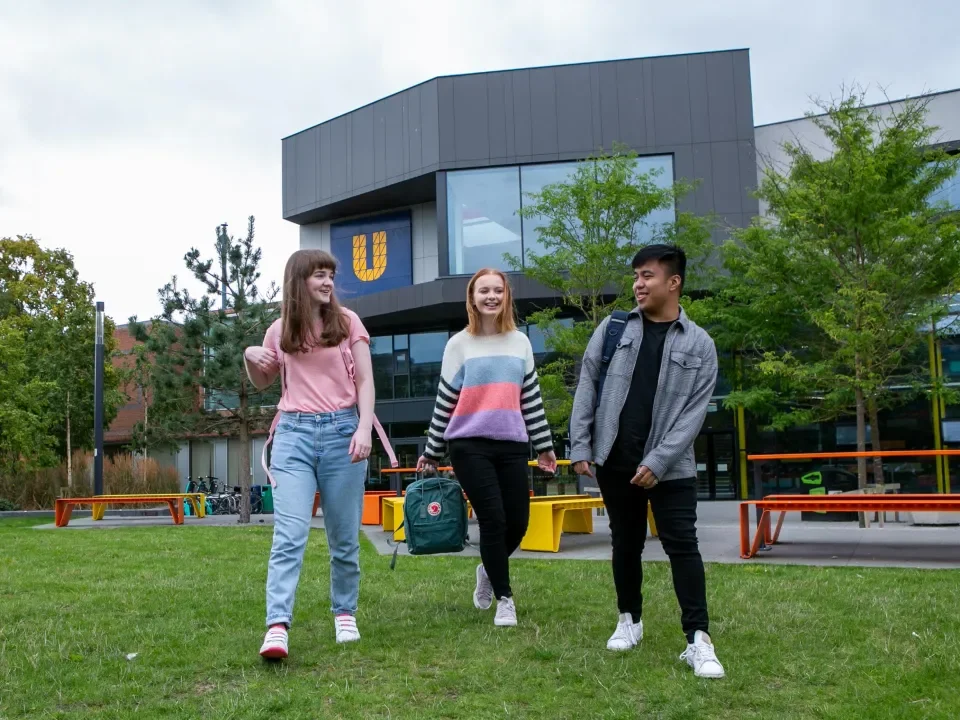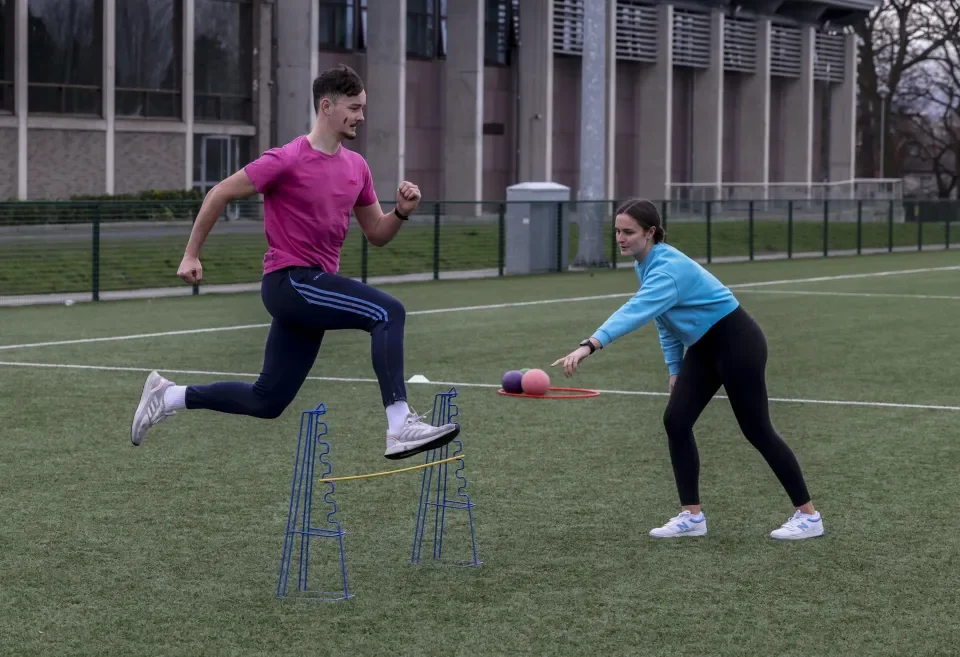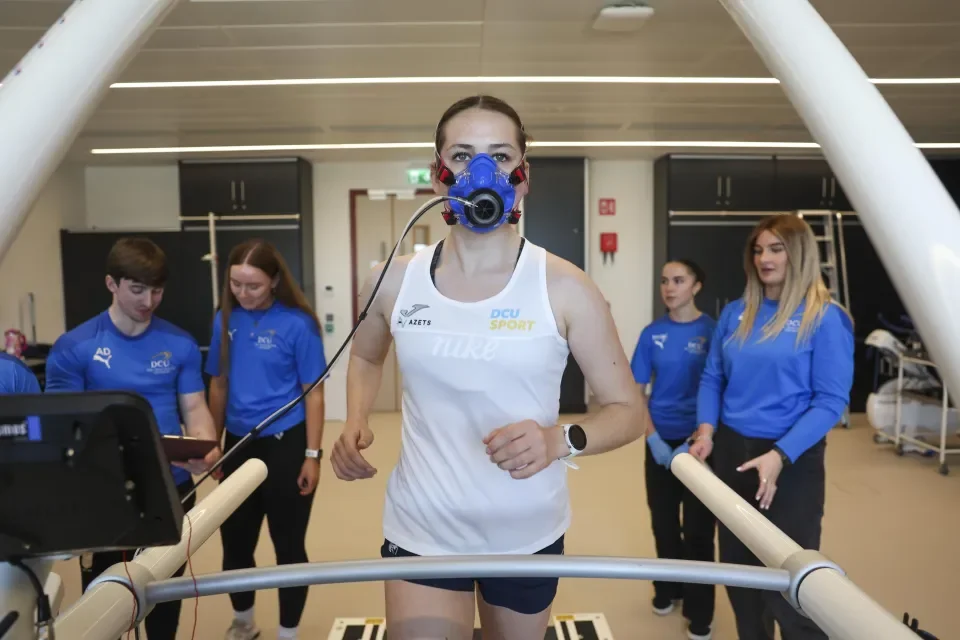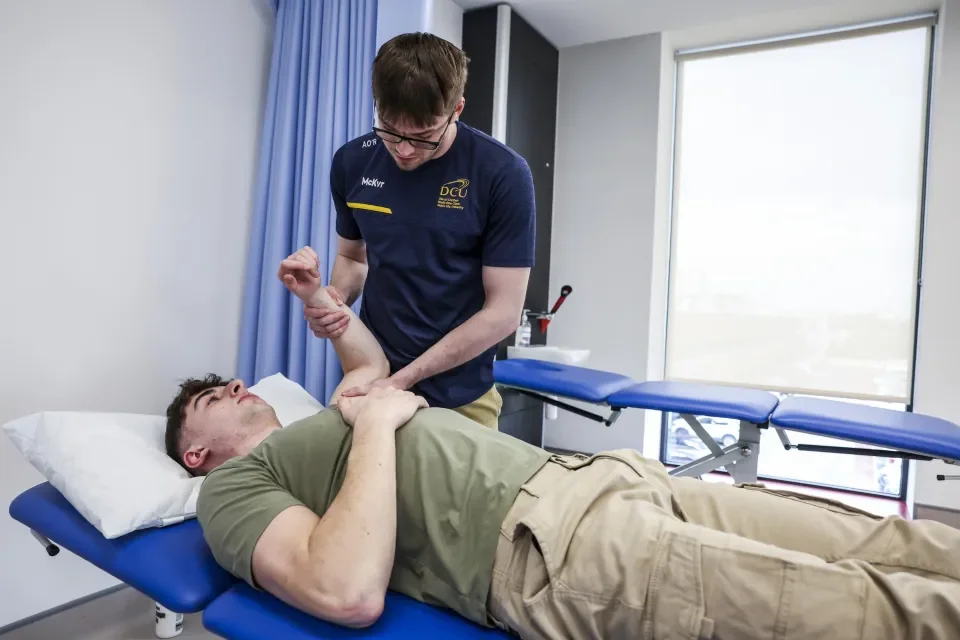Overview
Once you graduate from this course, you can teach these subjects up to Leaving Cert level or choose from a wide range of other exciting career paths.
This course offers a unique blend of academic subjects, taught in a way that emphasises learning through practical experiences. During the course, you’ll gain a comprehensive understanding of the content, theory, and skills of different physical activities (such as athletics, games, aquatics, dance, and outdoor activities), maths and education. You’ll also improve your communication, leadership, and critical thinking skills.
Future-proof your life
In both third and fourth year, you’ll do a comprehensive professional school placement and you can also choose to study overseas through the Erasmus programme. The course includes various ways of learning and teaching, for example face-to-face and online lectures, small group work, independent work, practical classes, professional placement, and research.
While you can go on to become a post-primary PE and maths teacher in Ireland or abroad, you’ll also well placed to go on to complete a coaching qualification or to pursue other careers in education, exercise science, physical education, physical therapy, and maths. Alternatively, you may go on to pursue a master’s or doctorate qualification.
Why DCU
DCU People

One of my main research areas involves systematic reviews and meta analyses. Many individual studies try to answer the same research question, but can have different results.
Read more about Mika Manninen

Choosing to study Physical Education with Mathematics in DCU has been one of the best decisions I’ve ever made.
Read more about Laura McManus
Careers & Further Options
Careers
When you graduate you will be qualified for teaching posts at all second-level schools (vocational, secondary, community and comprehensive schools) and for admission to the Open Register of the Teaching Council (see www.teachingcouncil.ie for further details).
Graduates are qualified to teach PE and Mathematics to Leaving Certificate level.
Through the many skills you have learned on this course, you can also pursue other options such as coaching, sports development and further education.
- Education
- Sports Development
DCU graduates are highly sought after by employers. Our Graduates work in environments ranging from large multinationals to SMEs, family businesses and start-ups across every sector.
DCU Careers Service has a number of learning and development initiatives in place for our students, giving them the skills they need for a successful career path.
Entry Requirements
In addition to the general entry requirements for admission to the university the following entry requirements apply
Minimum of O1 or H6 in Mathematics and minimum of O4 or H6 in one of Physics, Chemistry, Biology, Physics with Chemistry or Agricultural Science
In addition to the general entry requirements for admission to the university the following entry requirements apply
GCE A Level D or GCE AS Level C Mathematics and GCE A Level D or GCE AS Level C in one of Physics, Chemistry, Biology, Physics with Chemistry or Agricultural Science
Please visit our Admissions webpage for details on course requirements or how to apply to DCU.
Please visit our QQI FET webpage for details on DCU courses, open days, campus tours or school visits.
To apply to DCU, please visit www.cao.ie.
Applicants that have completed at least one year of study at NFQ Level 7 or 8 at another institution may apply to continue their studies on a similar programme at DCU. There should be substantial overlap in content between the two programmes to be considered for a transfer. The specific criteria for entry may vary for each programme. Results and other supporting documentation must be submitted to CAO by the closing date of 1st July. This is a competitive application process for a small quota of advanced entry places, so early application is advised. Submission of an application does not guarantee an offer. Offers are made on a rolling basis until all places are filled. Please note: Applicants should also consider applying through the appropriate route for first year entry to the programme they are interested in. This application process is only for advanced entry.
Teaching council certified qualifications that cover all modules in Year 1 of our programme are a pre-requisite for admission to the second year. Applicants may be required to attend an interview.
No entry path
Course Structure
- Mathematical Thinking
- Calculus
- Linear Algebra
- Microteaching and Teaching Preparation
- Teaching HRA in PE
- Irish Education History
- Motor Learning and Development
- Applied Studies in Games, Athletics, and Aesthetic Activities
- Microteaching and Teaching Preparation
- Developmental Psychology and Individual Differences
- Geometry
- Modelling with Differential Equations
- Calculus of Several Variables
- Probability, Descriptive, and Inferential Statistics
- Applied Studies in Aquatics, Adventure Activities, and Aesthetic Activities
- Physical Activity Psychology
- Applied Studies in Games
- Inclusion and Adaptation in PE and Physical Activity
- Programme Decisions, Policy, & Curriculum Models in PE
- Teaching and Assessing JC Maths
- Professional Placement
- Philosophical Perspectives on Education
- Access, Disadvantage, Equality in Education
- Discrete Maths
- Analysis
- Teaching and Assessing Senior Cycle Mathematics
- Abstract Algebra
- Teaching in Online and Blended Environments
- Adventure Activities
- Health and Fitness
- School Research
- Curriculum Development and Evaluation
- Applied Studies in Teaching and Learning PE and Maths
- Professional Placement
Fees and Funding
Fees
How To Apply
Applicants presenting EU School Leaving/FETAC Level 5 examinations: Apply through the Central Applications Office (CAO) by 1st February or 1st May
No entry path
All mature applicants apply through the CAO by 1st February. For further information and for special application procedures for mature students, please click here
Applications are made via the CAO Advanced Entry route which opens from the 5th of November until 1st July
Please see Application Procedures or E-mail ugadmissions@dcu.ie.
Candidates submitting EU* examination results are required to apply through the CAO at www.cao.ie.
*Applicants presenting examination results from outside the EU - No entry path.
Life On Campus
At DCU, our students can expect a unique campus experience. We are known for our excellent teaching and learning facilities, our active clubs and societies, and our great social and sporting facilities. All this makes DCU an exciting place to be.
DCU has three academic campuses; Glasnevin, St. Patrick’s and All Hallows (both in Drumcondra), all close to Dublin City centre.
They can be reached by public transport, Dublin Bus and Bus Éireann, with our Drumcondra campuses a ten minute walk from Drumcondra Train Station. Glasnevin is a 20 minute walk from St Patrick’s and All Hallows. They are also linked by Dublin Bus.
Each campus has a library (O’Reilly, Cregan and Woodlock Hall), study spaces, restaurants, and on-campus residencies. There are sports facilities on Glasnevin and St. Patrick’s, and there is a dedicated sports campus, St Claire’s, located near Glasnevin on the Ballymun Road.
DCU’s 19,000 students have access to exceptional teaching and learning facilities across our three academic campuses.
These include modern learning theatres, research centres, a new media and TV studio, radio/podcast studios, computer suites and advanced labs in the areas of Languages, Engineering, Physics, Chemistry and Biotechnology, as well as a Sports Performance centre and a training hospital ward. In 2021, we opened our first virtual reality ‘Leadership Lab’, which is located in our Business School.
We continue to improve and update our facilities. For example, construction of a new world-class STEM facility is underway on the Glasnevin campus. With capacity for an extra 3,000 STEM students, this facility will advance DCU’s international reputation for excellence in science and health, computing and engineering disciplines.
Studying in DCU isn’t just about course work. The university is rich in student life and activities.
There are more than 140 clubs and societies for students in DCU, with ‘Clubs & Socs’ days taking place on both the Glasnevin and Drumcondra campuses at the start of the academic year. They span everything from rugby to rock climbing, anime to jazz.
For many students, sport is an important part of the DCU experience. DCU’s Sports Complex boasts a 25 metre swimming pool, fitness centre gym, all-weather pitches and squash courts, as well as soccer, GAA and rugby pitches. DCU Dóchas Éireann, the university’s GAA club, is the largest third level Gaelic Games club in the country. Meanwhile, DCU Athletics has been Ireland’s highest achieving university club for many years. And DCU has dozens of other clubs to get involved in, from Archery to Weightlifting.
The Glasnevin campus is home to our purpose built, state-of-the-art student centre, The U, which serves the needs of a rapidly growing student body. Here, you will find the Student Leadership and Lifeskills Centre, performing arts and cultural spaces for students and the wider community, and the Entrepreneurship and Innovation Hub. Also located on our Glasnevin campus is The Helix, our renowned performing arts centre.
On our St Patrick’s campus, we have the Java Student Hub, a vibrant, warm and welcoming space where students can meet for coffee, play music, use the projector to watch events, or just relax. The walls of the Java Hub were designed based on the cultural history of St Patrick’s Campus, including the special references to the notable sporting history and history of the arts.
We have a number of academic, professional and social supports for students.
Student Advice & Learning Skills Centre - Offers a wide range of supports and services to students and advice
The Writing Centre - drop-in writing workshops for students through the academic year
Maths Learning Centre - provides maths support for students of all ability levels with maths modules
Student Learning - facilitate the transition from passive to active learning for students at DCU, by teaching study skills, nurturing critical thinking and building student confidence.
Careers work with students to help them on their professional journey into graduate employment.
Our student support team offers a comprehensive support programme, helping students make that all important transition into university life and focusing on building confidence and skills which are key to success at third level.
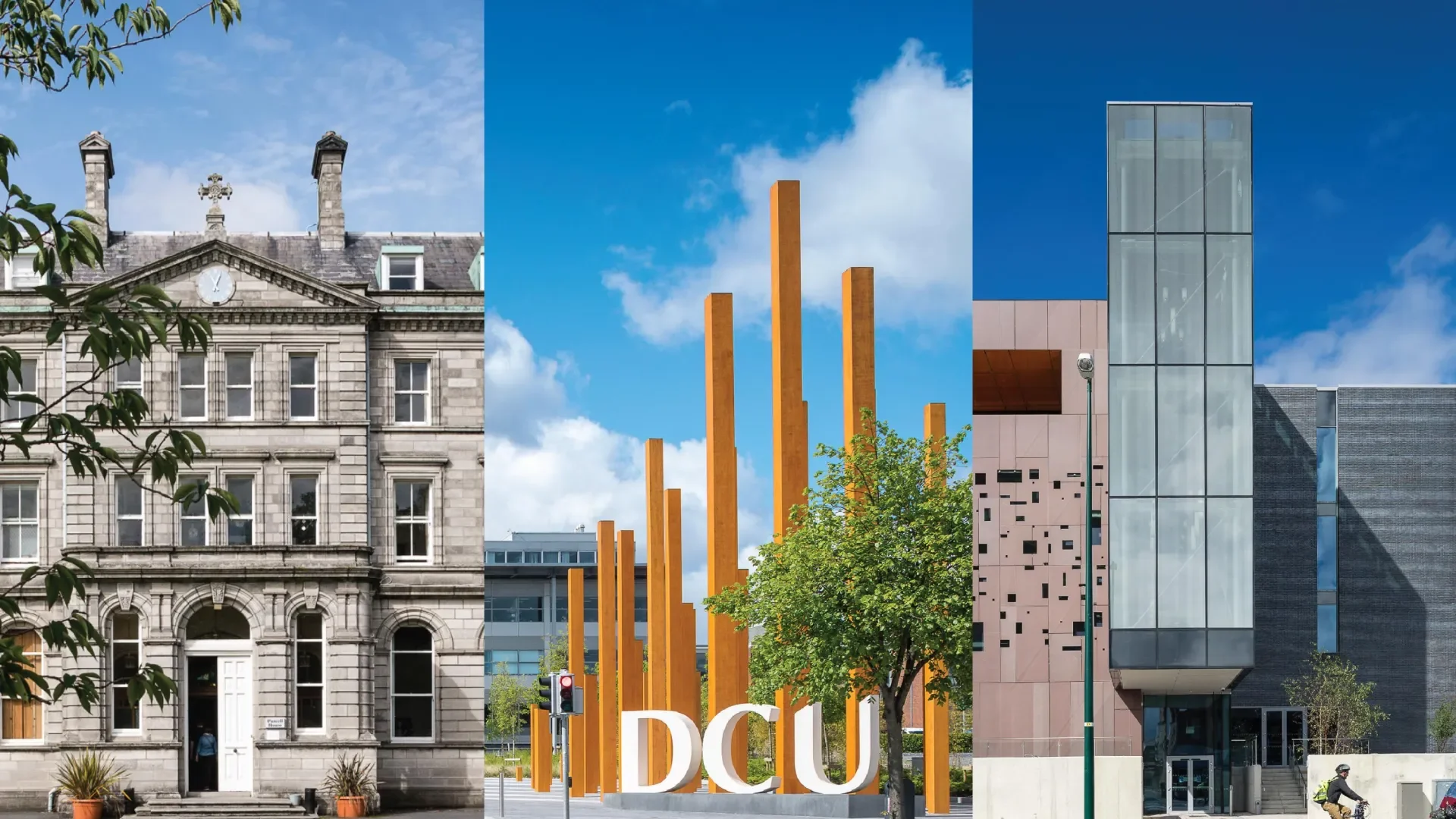
DCU Campus
FAQs
Is DCU all one campus?
DCU is a multi campus university - the Glasnevin, St Patrick's and All Hallows campuses. The St Patrick's campus is where the Education courses are taught and some of the subjects from the BA Joint Honours degree. There is a 20-25 minute walk between the campuses but there are buses and bikes available to go between them also.
Click here to see maps of all of our campuses
If I'm studying on the St Patrick's campus, can I use the library and sports centre on the Glasnevin campus?
Yes, all facilities such as sports and accommodation are open for all DCU students to avail of.
Are there libraries in DCU and if they have wifi and work stations?
We have a brand new state of the art four floor library on our St. Patrick's Campus which complements the existing library on the Glasnevin campus. There is free wifi, work stations as well as desktop computers.
Does DCU provide accommodation?
DCU does have on-campus accommodation for undergraduate and postgraduate students, and you can find out more and apply via the Accommodation Office webpage.

